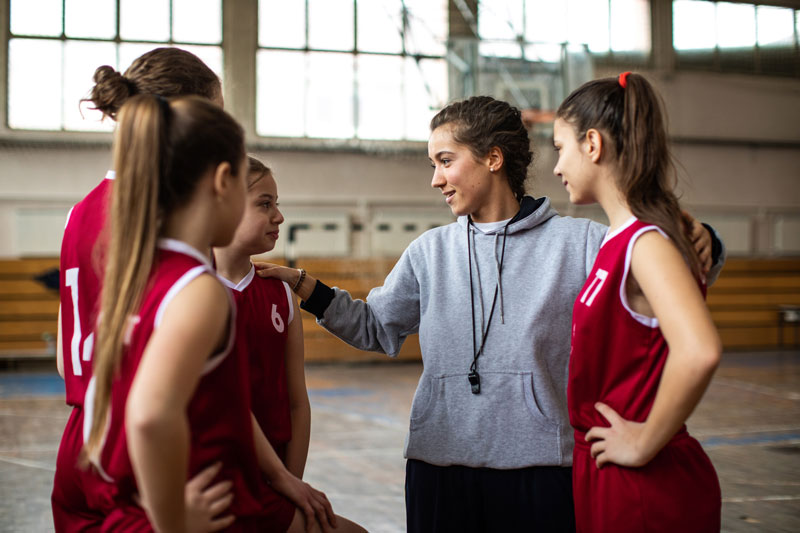
iStockphoto.com #1132012561
For decades, numerous research studies have shown that physical activity and sport play a significant role in positively shaping children’s health and emotional well-being. But, as we learn more about biology and psychology, it becomes clear that gender matters in ways not conceived of when John F. Kennedy became President in 1961 and re-energized the President’s Council on Youth Fitness, predecessor of the more recent President’s Council on Physical Fitness and Sport.
We know today that athletic participation, particularly in children, can favorably influence general health, self-esteem and body image, body weight, social relationships, quality of life, and educational attainment. But we also know that the playing field isn’t exactly level. In addition to biological differences (think: Q angles and a disproportionately high rate of ACL injury), girls and women who play sports often have to navigate the conflicting cultural messages about what it means to be a girl or woman and what it means to be an athlete.
The good news is that, more and more, they are not alone in this struggle. A recent academic research study and a new national report point to the increasing breadth of professional help available to girls and women who want to participate in sport—and the quantifiable impacts that those professionals provide.
Athletic Trainers Can Reduce the Injury Rate
In the research study, published in Injury Epidemiology, researchers found that the availability of a full-time certified athletic trainer in high school reduces overall and recurrent injury rates in girls who play on a soccer or basketball team.1 Schools with an athletic trainer are also better at identifying athletes with concussion. This is the first study to compare injury rates in schools that have an athletic trainer with schools that do not.
“Our results are significant because currently only about a third of high schools have access to a full-time athletic trainer,” said study coauthor Cynthia LaBella, MD, Medical Director of the Institute for Sports Medicine at Ann & Robert H. Lurie Children’s Hospital of Chicago, and Professor of Pediatrics at Northwestern University Feinberg School of Medicine. “The positive impact we observed is likely because athletic trainers are licensed healthcare professionals who work with coaches and athletes to apply evidence-based injury prevention strategies, and they are able to recognize and manage injuries when they happen, which may reduce severity or complications.”
LaBella and colleagues analyzed data from 2 injury-reporting systems, for high schools with an athletic trainer and for those without, over a 2-year period. They found that overall injury rates in both girls’ soccer and basketball were significantly higher in schools without an athletic trainer. Recurrent injury rates were 6 times higher in girls’ soccer and nearly 3 times higher in girls’ basketball in schools without an athletic trainer.
Good Coaches Make Sports Fun for Girls
Sports, particularly for children, should be fun. Making sports fun, in addition to nurturing skills and teamwork, is something great coaches do—and it could be the key to keeping girls active. New research on girls 7 to 13 years of age who play sports reveals that, when girls like their coaches, they are more likely to keep playing as they get older, to see the importance of being active, and to love their sport. These were just some of the findings in a recently released report, Coaching Through a Gender Lens: Maximizing Girls’ Play and Potential, from the Women’s Sports Foundation (WSF).
This first-of-its-kind report, developed in partnership with Nike Inc.’s Social & Community Impact program, examines the intersection of girls’ sports development needs with their “current-day” experiences. It captures data through the voices of girls, their parents, and experts in girls’ development and sports—with the goal of identifying coaching practices to support girls’ initiation and continued participation in sports. The persistent gender gap and disproportionate sports dropout rate for girls—which increase as they transition to early adolescence – show a clear need for coaching practices that address girls’ challenges and nurture their love of sport. Coaches are vital in getting and keeping girls involved.
“We know that, through sports, girls grow and thrive in limitless ways, and the coaches who teach, encourage, and inspire them play a vital role in keeping girls active,” said WSF Chief Executive Officer Deborah Antoine, PhD, in a press release. “Our Foundation’s enduring commitment is to ensure that all girls and all women have access to sports and physical activity, together with the benefits they provide. We were purposeful in designing this research to examine the girl-parent-coaching dynamic through a gender lens, to discover best practices for maximizing girls’ personal and sport potential.”
The multidimensional study includes interviews with experts in girls’ development and sports, a national survey of girls 7 to 13 years of age who participate in sports and their parents (N = 1129), and a survey of exemplary programs from WSF community partners. According to report findings, 93% of girls surveyed “loved” or “liked” their sport, which was key to their continued desire to play in high school and beyond. Most girls (≥85%) reported that their coaches created a positive environment that encourages safety, fun, and healthy competition. Furthermore, the girls’ feedback highlighted the importance of supportive coaching practices that reward effort for trying a new skill over winning; encourage learning from mistakes while staying positive; and promote integrity and honesty.
Both experts and program leaders confirm that gender-informed approaches can counterbalance cultural messages that often signal to girls that “sports are for boys.” Additionally, female coaches are powerful role models, demonstrating to girls that they belong and deserve to be included in sports, thus boosting girls’ confidence and inspiring their continued participation.
“This research reinforces the power of all coaches to increase girls’ confidence and participation in sports,” said Caitlin Morris, General Manager of Nike Inc.’s Global Community Impact program. “In addition, female coaches serve as catalysts to inspire more girls to get active because if she can see it, she can be it.”
Download Coaching Through a Gender Lens: Maximizing Girls’ Play and Potential at: www.womenssportsfoundation.org/coachinggirls.
Reference
Pierpoint LA, LaBella CR, Collins CL, Fields SK, Dawn Comstock R. Injuries in girls’ soccer and basketball: a comparison of high schools with and without athletic trainers. Inj Epidemiol. 2018;5(1):29.









